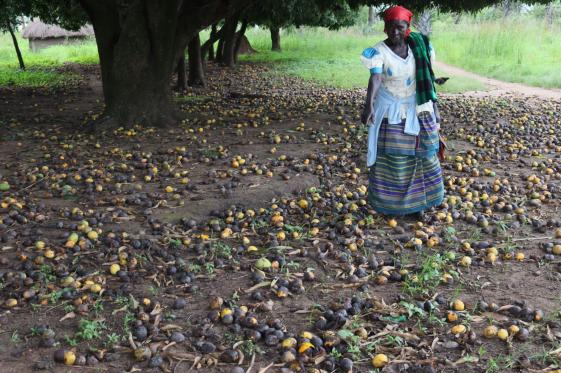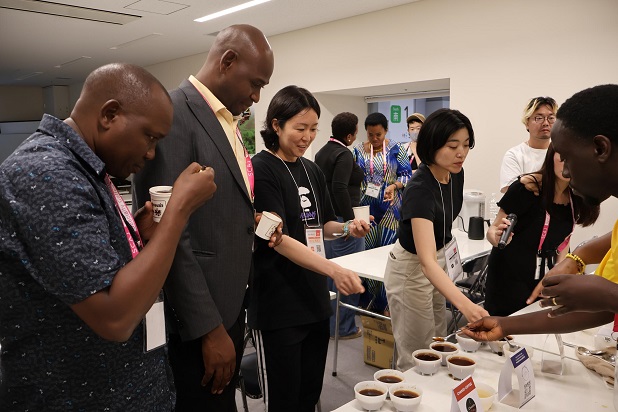A woman shows mangoes that are rotting away in Bongolaku village in Labongo Akwang Subcounty,Kitgum district/URN Photo.
Farmers in Kitgum and Pader Districts are counting losses as their organically grown mangoes rot away over limited markets.
It is the mango season in the region and most homesteads within rural and some urban areas with mango trees are flourishing with ripe fresh mangoes.
However, farmers say despite the annual yield of mangoes, few of these fresh fruits end up in the market since the bulk of them is left to rot away.
Flavia Akello, a mango vendor at Aromorwot village in Labongo Amida Sub-county in Kitgum District says that the scarcity of market and clients to purchase their mangoes has affected their business.
According to Akello, a basin full of mangoes used to cost Shs4,000, but the price has lowered currently to Shs500 to Shs1,000 only.
Hellen Laryang, a mango farmer who owns more than 30 mango trees in Dure central village in Latanya Sub-county, in Pader District notes that several tons of mangoes are rotting away in her orchard because she doesn’t have markets.
She says there is a need for the government and the district local government to tap into the abundant mangos produced in the area by setting up a ready market and fruit processing factory to limit losses farmers are making.
Patrick Olanya, a mango farmer in Bongo-laku village in Tumangu ward, Labongo Akwang Sub-county in Kitgum District equally shares a similar plight.
Olanya says annually, hundreds of kilograms of fresh mangoes have been rotting away on his farm because there is no market for them.
“There are numerous farmers who produce the same mangoes in this area. There is no market locally and even at the national level, no one can come to buy from me in the village,” He says.
Olanya says with good storage facilities established in the region, mango shelve life could go longer and offer farmers more time to sell without having to worry about mangoes rotting away.
Alfred Omony, Kitgum District Production officer acknowledges that farmers in the district are facing challenges of the market for their fruits. Omony notes that the challenge is created by the high supply of mangoes since most mangoes ripen within the same period of April and May yet there is a low demand for the fruits within and outside the district.
He says the mangoes that the farmers in Acholi produce are local organic types that are not marketable to some fruit processing factories that prefer grafted mangoes with fewer fibres.
Omony says although the district has no plans insight to help the farmers, they shouldn’t lose hope since a juice processing factory that uses the local organic mangoes established in Yumbe District will next season be their market destination.
The government through the National Agricultural Advisory Services (NAADS) has so far invested shillings 8.9 billion to establish Yumbe Mango Processing Factory in Yumbe district.
The factory designed based on the local mangoes grown in the West Nile region will process 6 metric ton of
A woman shows mangoes that are rotting away in Bongolaku village in Labongo Akwang Subcounty,Kitgum district/URN Photo.
Farmers in Kitgum and Pader Districts are counting losses as their organically grown mangoes rot away over limited markets.
It is the mango season in the region and most homesteads within rural and some urban areas with mango trees are flourishing with ripe fresh mangoes.
However, farmers say despite the annual yield of mangoes, few of these fresh fruits end up in the market since the bulk of them is left to rot away.
Flavia Akello, a mango vendor at Aromorwot village in Labongo Amida Sub-county in Kitgum District says that the scarcity of market and clients to purchase their mangoes has affected their business.
According to Akello, a basin full of mangoes used to cost Shs4,000, but the price has lowered currently to Shs500 to Shs1,000 only.
Hellen Laryang, a mango farmer who owns more than 30 mango trees in Dure central village in Latanya Sub-county, in Pader District notes that several tons of mangoes are rotting away in her orchard because she doesn’t have markets.
She says there is a need for the government and the district local government to tap into the abundant mangos produced in the area by setting up a ready market and fruit processing factory to limit losses farmers are making.
Patrick Olanya, a mango farmer in Bongo-laku village in Tumangu ward, Labongo Akwang Sub-county in Kitgum District equally shares a similar plight.
Olanya says annually, hundreds of kilograms of fresh mangoes have been rotting away on his farm because there is no market for them.
“There are numerous farmers who produce the same mangoes in this area. There is no market locally and even at the national level, no one can come to buy from me in the village,” He says.
Olanya says with good storage facilities established in the region, mango shelve life could go longer and offer farmers more time to sell without having to worry about mangoes rotting away.
Alfred Omony, Kitgum District Production officer acknowledges that farmers in the district are facing challenges of the market for their fruits. Omony notes that the challenge is created by the high supply of mangoes since most mangoes ripen within the same period of April and May yet there is a low demand for the fruits within and outside the district.
He says the mangoes that the farmers in Acholi produce are local organic types that are not marketable to some fruit processing factories that prefer grafted mangoes with fewer fibres.
Omony says although the district has no plans insight to help the farmers, they shouldn’t lose hope since a juice processing factory that uses the local organic mangoes established in Yumbe District will next season be their market destination.
The government through the National Agricultural Advisory Services (NAADS) has so far invested shillings 8.9 billion to establish Yumbe Mango Processing Factory in Yumbe district.
The factory designed based on the local mangoes grown in the West Nile region will process 6 metric ton of
A woman shows mangoes that are rotting away in Bongolaku village in Labongo Akwang Subcounty,Kitgum district/URN Photo.
Farmers in Kitgum and Pader Districts are counting losses as their organically grown mangoes rot away over limited markets.
It is the mango season in the region and most homesteads within rural and some urban areas with mango trees are flourishing with ripe fresh mangoes.
However, farmers say despite the annual yield of mangoes, few of these fresh fruits end up in the market since the bulk of them is left to rot away.
Flavia Akello, a mango vendor at Aromorwot village in Labongo Amida Sub-county in Kitgum District says that the scarcity of market and clients to purchase their mangoes has affected their business.
According to Akello, a basin full of mangoes used to cost Shs4,000, but the price has lowered currently to Shs500 to Shs1,000 only.
Hellen Laryang, a mango farmer who owns more than 30 mango trees in Dure central village in Latanya Sub-county, in Pader District notes that several tons of mangoes are rotting away in her orchard because she doesn’t have markets.
She says there is a need for the government and the district local government to tap into the abundant mangos produced in the area by setting up a ready market and fruit processing factory to limit losses farmers are making.
Patrick Olanya, a mango farmer in Bongo-laku village in Tumangu ward, Labongo Akwang Sub-county in Kitgum District equally shares a similar plight.
Olanya says annually, hundreds of kilograms of fresh mangoes have been rotting away on his farm because there is no market for them.
“There are numerous farmers who produce the same mangoes in this area. There is no market locally and even at the national level, no one can come to buy from me in the village,” He says.
Olanya says with good storage facilities established in the region, mango shelve life could go longer and offer farmers more time to sell without having to worry about mangoes rotting away.
Alfred Omony, Kitgum District Production officer acknowledges that farmers in the district are facing challenges of the market for their fruits. Omony notes that the challenge is created by the high supply of mangoes since most mangoes ripen within the same period of April and May yet there is a low demand for the fruits within and outside the district.
He says the mangoes that the farmers in Acholi produce are local organic types that are not marketable to some fruit processing factories that prefer grafted mangoes with fewer fibres.
Omony says although the district has no plans insight to help the farmers, they shouldn’t lose hope since a juice processing factory that uses the local organic mangoes established in Yumbe District will next season be their market destination.
The government through the National Agricultural Advisory Services (NAADS) has so far invested shillings 8.9 billion to establish Yumbe Mango Processing Factory in Yumbe district.
The factory designed based on the local mangoes grown in the West Nile region will process 6 metric ton of mangoes into fruit per hour.





